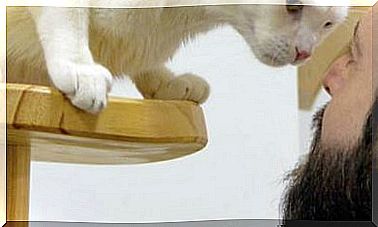7 Self-delusions That Leave Us Anchored In Our Comfort Zone
Mental limitations that prevent us from moving forward. We have all suffered them at some time, but naturally we can rebuild our emotions.

Within the area of personal growth, there is a lot of talk about the comfort zone, which seems to be on everyone’s lips lately. But what is it really?
The comfort zone is a term used to refer to a vital day-to-day situation that implies a certain regularity and familiarity. As its name suggests, it is that dynamic of behaviors and habits that imply comfort in the sense that we repeat the patterns that we have already learned and move in the circles that we already know, therefore, there is nothing out of the extraordinary that put us in a bind.
Beyond the comfort zone
When, on the contrary, something new arises that we have to face, we leave that comfort zone and enter another dimension: the fear zone. The new and the unknown scare us, those things for which we don’t yet have an elaborate answer that we know will work.
They have taken us out of the terrain in which we know how to move and in this new area, our personal resources are put at stake, we put our insecurities to the test. And then we move on to another zone, the learning zone. This new zone presents us with challenges that broaden our repertoire of personal skills and, as a consequence, broaden our comfort zone.
What prevents us from leaving our comfort zone?
Very negative connotations have been linked to the comfort zone, such as conformity, ignorance, fear … However, the comfort zone is nothing more than that reality to which we have managed to adapt successfully. However, the larger it is, the more resources we have to adapt to diverse situations, which will mean that more times we have exposed ourselves to situations that were initially new and threatening, and therefore are no longer so.
Therefore, the problem is not being in the comfort zone, but the fear of getting out of it, staying in a very reduced comfort zone. And to avoid facing danger, there are several types of cognitive distortions that human beings have, to deceive ourselves and convince ourselves without realizing that we do not need to go beyond comfort, and thus saving us the effort of learning.
1. Confirmation bias
This is a very common bias that is based simply on the principle of savings. It refers to the tendency to focus our attention on what confirms our beliefs, associating it with the necessary arguments to make our idea stronger, looking for the way that ambiguous information fits within our position and downplaying or looking for errors in the information that we would throw away. our idea overboard.
This mechanism that our mind has is partly adaptive, since it protects us from constant doubt about any aspect of our reality, and from having to constantly question and review our ideas, thus providing us with security in front of the world.
That is why it is difficult for us to get out of our comfort zone, fleeing from facing the feeling of “not knowing”, which we perceive as a danger. However, this implies taking a rigid stance and resistance to change and, therefore, to learning.
2. Anchor bias
As its name suggests, this bias refers to our tendency to anchor ourselves in certain aspects of reality, ignoring the rest and forgetting them. It is to be aware that there are things beyond but to ignore it, in order to reaffirm ourselves with what we already have.
Somehow this bias takes away the pressure of being aware that there are many things that we would like to do, but that it does not matter if we do not do it, it does not matter. We anchor ourselves in our present reality and you’re done, taking a stubborn stance on what we already have.
3. Hindsight bias
This distortion refers to a defense mechanism that makes us see the things we have gone through as positive. It saves us the feeling of regret and remorse, since what is done is done. And therefore, the positive balance we make over our lives urges us to stay where we are, since it has been the best possible decision and changes are not necessary.
Although torturing yourself for not having done your best in the past is not the most beneficial, it is important to be aware of those things that we could have improved and learn from mistakes. Since to learn from mistakes, we must first be able to remember them.
4. Exposure gap bias
This bias refers to the impact that what we are most exposed to has on us. In other words, people tend to feel a greater attraction and predilection for those things that are known and familiar to us, and this causes a gap in our capacity for discernment and critical thinking.
This principle is very much followed in advertising, in politics, in fashions. What is familiar ends up liking us more, no matter what it is, and gives us more confidence. Therefore, our tendency is to flee, distrust and dislike what we do not know (until we begin to know it!).
Being aware of this effect, why don’t we give ourselves a chance to learn more about the unknown and let it impress us?
5. Fear of loss
The fear of loss refers to the preference we have for what we already possess and know, and our tendency to respond more to the possibility of gain than to the possibility of loss. For example, the average person would prefer to keep € 30 over the possibility of winning € 100, if he runs the risk that if he does not win, he will lose that € 30. Somehow, the saying “better known bad than good to know” makes mention of this effect.
This happens because our “I”, that is, our sense of identity, we extend it to those things, people, places, that surround us, forming part of our identity, and therefore the idea of letting go of it generates some anxiety. and feeling of being lost.
6. Cognitive dissociation
Dissociation means the opposite of association. In this case, it would be a dissociation between our cognition (what we think) and our doing, so they would go in different directions.
It happens on numerous occasions that we tell the people around us everything we would like and would like to do, but then there never comes a time when we really do it. And it is that, somehow we complete with our saying the fantasy of realizing it, supplying reality with fantasy. It can also be a way of delaying our decision making or convincing ourselves that we will one day, to calm our desire. However, this habit can do us a lot of harm, since we cannot put things off forever, and in the end they will end up causing us discomfort. We must take action on the matter …
7. Blind spot bias
Finally, reading all this can make us see things very clearly, but especially if we think about the case of other people, who we see mistakes very easily. Because in ourselves we have a tangle that seems impossible to penetrate.
This always happens, that the cases of others are easier for us to conceive than our own, as they are not tinged with our own defense mechanisms. And this is precisely what the blind spot bias refers to, since about ourselves we have a blind spot that prevents us from seeing our barriers and prejudices, which make it difficult for us to move away from the point of view we already have and therefore, to evaluate ourselves in a way. more impartial.
Recapping
Thus, if you have been able to identify which cognitive biases keep you from facing new situations that will involve learning, it will be useful to take them into account so as not to be fooled by them, so that they do not prevent you from continuing to grow.
The best way to get out of the comfort zone is to travel, since it implies a complete change of environment, customs, ways of thinking, etc. But the truth is that it is not the only one and that it should not be so radical. We can just make small changes, try to do things slightly differently, and see if that leads to different results. The important thing is not to abandon everything that we have already learned, but not to be afraid to continue learning.









